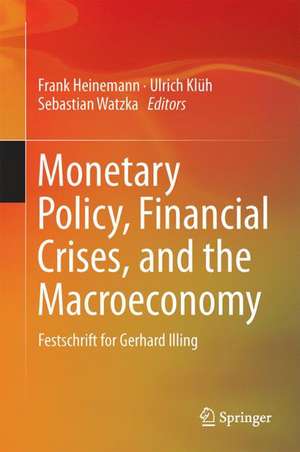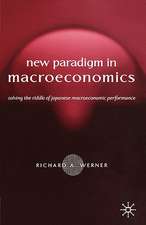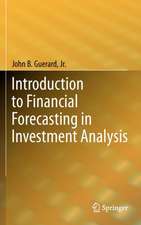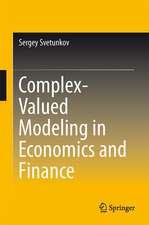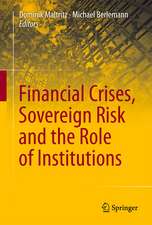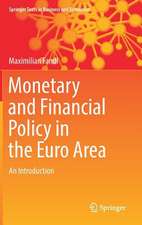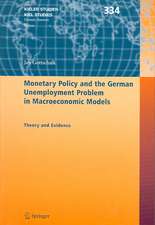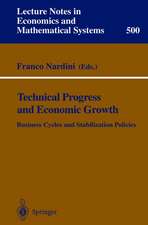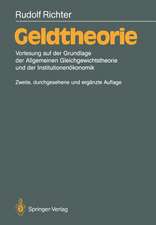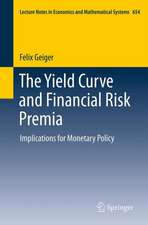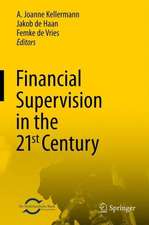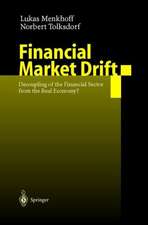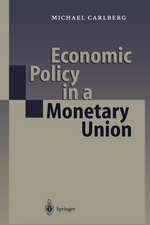Monetary Policy, Financial Crises, and the Macroeconomy: Festschrift for Gerhard Illing
Editat de Frank Heinemann, Ulrich Klüh, Sebastian Watzkaen Limba Engleză Hardback – 11 oct 2017
| Toate formatele și edițiile | Preț | Express |
|---|---|---|
| Paperback (1) | 738.92 lei 38-44 zile | |
| Springer International Publishing – 14 aug 2018 | 738.92 lei 38-44 zile | |
| Hardback (1) | 953.65 lei 6-8 săpt. | |
| Springer International Publishing – 11 oct 2017 | 953.65 lei 6-8 săpt. |
Preț: 953.65 lei
Preț vechi: 1162.99 lei
-18% Nou
Puncte Express: 1430
Preț estimativ în valută:
182.47€ • 190.54$ • 150.68£
182.47€ • 190.54$ • 150.68£
Carte tipărită la comandă
Livrare economică 15-29 aprilie
Preluare comenzi: 021 569.72.76
Specificații
ISBN-13: 9783319562605
ISBN-10: 3319562606
Pagini: 340
Ilustrații: VIII, 351 p. 24 illus. in color.
Dimensiuni: 155 x 235 mm
Greutate: 0.68 kg
Ediția:1st ed. 2017
Editura: Springer International Publishing
Colecția Springer
Locul publicării:Cham, Switzerland
ISBN-10: 3319562606
Pagini: 340
Ilustrații: VIII, 351 p. 24 illus. in color.
Dimensiuni: 155 x 235 mm
Greutate: 0.68 kg
Ediția:1st ed. 2017
Editura: Springer International Publishing
Colecția Springer
Locul publicării:Cham, Switzerland
Cuprins
Introduction.- Part I Liquidity From a Macroeconomic Perspective.- Balancing Lender of Last Resort Assistance with Avoidance of Moral Hazard.- Network Effects and Systemic Risk in the Banking Sector.- Optimal Central Bank Policy in Different Financial Systems.- Contagion Risk during the Euro Area Sovereign Debt Crisis: Greece, Convertibility Risk, and the ECB as Lender of Last Resort.- The Case for the Separation of Money and Credit.- Part II Putting Theory to Work: Macro-Financial Economics from a Policy Perspective.- (Monetary) Policy Options for the Euro Area: A Compendium to the Crisis.- On Inflation Targeting and Foreign Exchange Interventions in a Dual Currency Economy.- Macroprudential Analysis and Policy - Interactions and Operationalization.- Are Through-the-Cycle Credit Risk Models a Beneficial Macro-Prudential Policy Tool?.- Assessing Recent House Price Developments in Germany – An Overview.- Part III Re-Conceptualizing Macroeconomics: An Interdisciplinary Perspective.- German Unification: Macroeconomic Consequences for the Country.- Approaches to Solving the Eurozone Sovereign Default Problem.- Appraising Sticky Prices, Sticky Information, and Limited Higher-Order Beliefs in Light of Experimental Data.- Rising Income Inequality: An Incentive Contract Explanation.- No More Cakes and Ale: Banks and Banking Regulation in the Post-Bretton-Woods Macro-Regime.- Letter to Gerhard Illing.
Notă biografică
Frank Heinemann is professor of macroeconomics at the Berlin University of Technology. His main research interests are monetary macroeconomics, financial crises, and experimental economics.
Ulrich Klüh is professor of economics at Hochschule Darmstadt. His main research interests are macroeconomic theory and policy, central banking, financial markets and institutions, and history and theory of economic thought.
Sebastian Watzka is assistant professor at the Seminar for Macroeconomics of the University of Munich, LMU. His research interests are monetary policy and financial markets, financial crises, inequality and unemployment.
Ulrich Klüh is professor of economics at Hochschule Darmstadt. His main research interests are macroeconomic theory and policy, central banking, financial markets and institutions, and history and theory of economic thought.
Sebastian Watzka is assistant professor at the Seminar for Macroeconomics of the University of Munich, LMU. His research interests are monetary policy and financial markets, financial crises, inequality and unemployment.
Textul de pe ultima copertă
This volume investigates different aspects of monetary policy and prevention of financial crises. It discusses some recently suggested measures for central banks' responses to liquidity shortages and to the liquidity trap, methods for assessing the potential of crisis contagion via the interbank network, and the interaction between micro- and macro-prudential regulation. It compares different approaches for solving the Eurozone sovereign-debt problem and provides a new and intriguing explanation for rising income inequality. The authors are experts on monetary policy, financial crises, and contract theory from different European universities and central banks.
